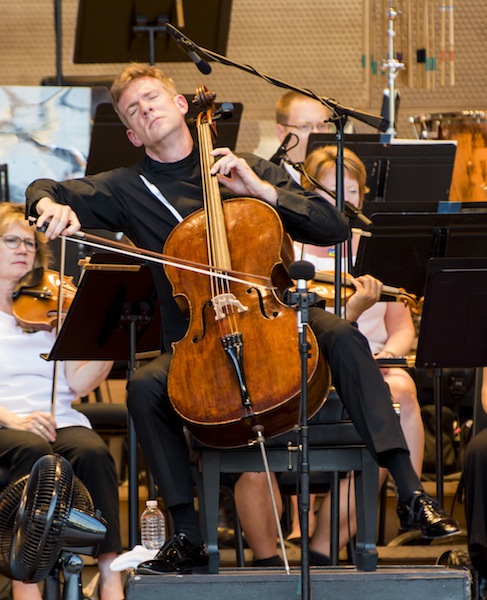Grant Park Orchestra, cellist Moser beat the heat with Czech program

How hot was it at the Grant Park Music Festival Friday night? So hot they had to cancel a work titled Summer Evening.
With the temperature in the mid-90s at concert time and the heat index well over that, the musician union rules kicked in, mandating a shorter program and 30-minute intermission. Some audience members elected to depart at the break rather than sit around in the heat for a half-hour to hear just 23 more minutes of music.
Even with the challenging heat and humidity, the focus stayed squarely on the music where it belonged. Cellist Johannes Moser, the evening’s soloist, and Carlos Kalmar and the Grant Park Orchestra handled the conditions like the veteran troupers they are, delivering strong and committed performances under trying circumstances.
Dvořák’s Cello Concerto in B minor was the main work on the de facto all-Czech program. Rather than being discomfited by the weather, Moser took it all in stride. There was a small slip in the opening movement and the cellist’s tempo was a bit cautious in the solo run up to the first movement’s central climax. But for the most part, Moser’s playing was dramatic and remarkably polished even with intense humidity that can produce damp strings and play havoc with intonation. Moser wiped his strings with a cloth when he could and took a drink of water before the start of the second movement, lightly toasting the audience with his bottle.
If anything, the weather seemed to galvanize Moser’s performance, with the German cellist bringing rich, beautifully burnished tone and uncommon urgency and bite to this much-played cello warhorse.
Moser was a much more ardent and expressive solo protagonist Friday night than in his rather technocratic 2015 recording (Pentatone). In the Adagio, the reflective solo rumination was rendered with hushed, inward emotion. And in the final movement, Moser brought a touching vein of gentle, nostalgic tenderness to the reminiscence before the fiery coda.
A couple instrumental slips apart due to the heat, the Grant Park musicians were on the same high level as their soloist. Kalmar drew fiery and majestic orchestral playing and consistently underlined Dvořák’s felicitous scoring, finding fresh, rarely heard wind lines even in this familiar work.
With Zoltan Kodaly’s Summer Evening jettisoned, the shortened program closed after the extended intermission with Leoš Janáček’s Sinfonietta.
Still, the best piece ever written for a gymnastics exhibition, the Sinfonietta was performed in Erwin Stein’s reduced orchestration. The massive instrumentation called for in Janáček’s original version–including 14 trumpets–are pared down to more typical Late Romantic orchestral forces.
Yet there was no lack of power or punch in the Grant Park Orchestra’s performance. The ceremonial, quasi-medieval fanfares that open and close the work were delivered with bracing sonic impact. The players put across the fragmented Moravian rhythms and the elephantine children’s ditty of the fourth movement with polish and agility.
The Sinfonietta is often played as a spectacular for brass, but Kalmar consistently plumbed beneath the surface. Amid the showy brilliance, the performance also found a compensating delicacy, as in the lushly spun cello theme of the second movement and the long, lyrical lines of the third.
Friday’s Sinfonietta also conveyed the unsettling strangeness of this music, with the primordial wildness of the flutes and piccolo sounding almost unhinged. Throughout Kalmar and the musicians invested the score with a complexity and weight that went beyond mere brassy exuberance.
The program will be repeated 7:30 p.m. Saturday at the Pritzker Pavilion. gpmf.org
Posted in Performances




